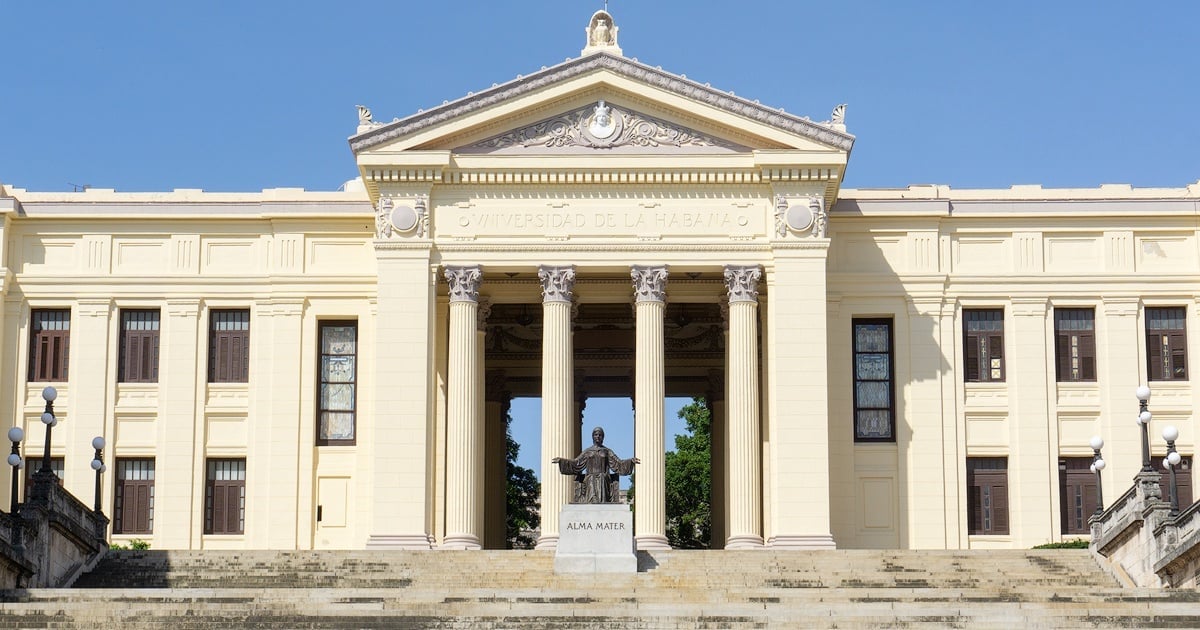Five faculties at the University of Havana have called for the removal of the president and vice president of the Federation of University Students (FEU) due to alleged misuse of authority. This unprecedented decision was made on Friday, when representatives from the faculties of Philosophy, History and Sociology, Mathematics and Computer Science, Psychology, Biology, and the Higher Institute of Design approved a letter to the National Secretariat of the FEU. The letter demands the dismissal of the president, Hugo Fuentes Surduy, and vice president, Daniel Alejandro Corrales Ponce, for what they describe as "abuse of the authority granted to them."
In a message shared on social media, the faculties accused the two leaders of acting "deliberately" and failing to uphold "agreements made during FEU UH Council meetings on two occasions." The statement highlights that the officials concealed information from students following meetings with the Telecommunications Company (ETECSA), amid the backlash against the controversial pricing overhaul by the state-run communications monopoly.
Moreover, the faculties criticized the FEU leaders for not issuing a statement regarding the University of Havana’s stance on ETECSA's measures, nor did they disclose the outcomes of the June 3 meeting with ETECSA. Last week, amidst growing opposition to the internet rate hikes in Cuba, the FEU provided a report containing over 40 proposals directed at ETECSA, following discussions between both parties.
The meeting, attended by representatives of the Communist Party, the government, the UJC, and the FEU itself, appeared to be a tactical move to quell the wave of criticism over the newly implemented mobile data pricing. While the discussions included proposals ranging from technical adjustments to changes in the company’s communication strategy, the overall tone seemed more like a subtle defense of the state entity than a genuine representation of the students’ dissatisfaction.
The initiatives proposed included a review of pricing policies and data packages, social and economic impact projects, technical fault diagnostics (such as batteries, nodes, and infrastructure), the creation of a crisis manual, and suggestions for "effective communication" to better engage the public.
Beyond the proposals, the situation highlights a disconnect between the FEU leadership and the majority of the student body, who demanded a more assertive stance against the so-called “tarifazo.” Luis Yoel González, vice president of the FEU at the University of Pedagogical Sciences, expressed gratitude for the discussions, acknowledged ETECSA's efforts, and urged understanding of the measures “based on the information received,” thereby softening the initial backlash, according to the state-run Cubadebate.
Similarly, José Alberto Almeida from the University of Havana’s FEU emphasized the technical expertise of ETECSA specialists and suggested that university students should contribute to national solutions, aligning his speech with the official narrative.
Below is the full text of the communication from MatCom-FEU:
This Friday, the FEU Council of the faculties of FHS, MatCom, Psychology, ISDI, and FBio resolved to send a letter to the National Secretariat of the FEU, requesting the dismissal of the president (Hugo Fuentes Surduy) and vice president (Daniel Alejandro Corrales Ponce) of the University of Havana’s FEU for abuse of authority. This decision allows for potential re-election after a one-year term. Their actions were described as deliberate, contravening the resolutions made in two FEU UH Council meetings, and concealing information from university students through the established channels.
According to Articles 225 and 239 of Chapter VIII of the organization's ABC, the unfulfilled agreements were:
- Issuing a statement on the UH’s position regarding ETECSA’s measures, requested since Friday, May 30, and reaffirmed at a UH Council meeting on Tuesday, June 3.
- Reading and announcing these agreements during the meeting with ETECSA on Tuesday, June 3.
FAQs on the University of Havana FEU Leadership Controversy
What led to the call for the removal of the FEU president and vice president?
The faculties accused the FEU leaders of abusing their authority by deliberately failing to implement and communicate key agreements made during FEU Council meetings, especially concerning discussions with ETECSA.
What were the main issues with the ETECSA meetings?
The FEU leadership allegedly did not inform students of the outcomes from meetings with ETECSA about new pricing policies and failed to issue a statement on the University’s stance, which was part of their obligations.
